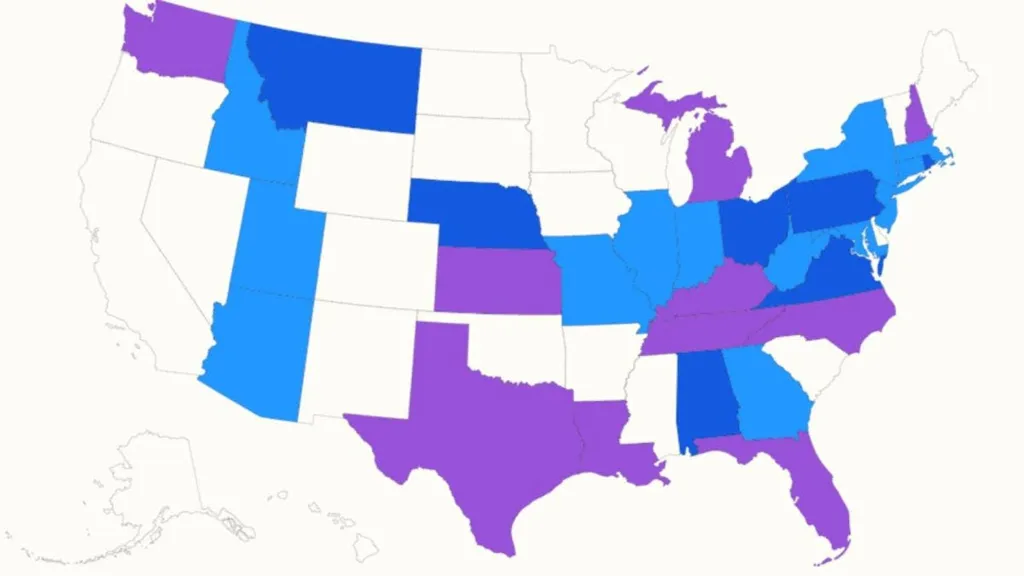Columbus Day falls on the second Monday of October, and different states across the country will be celebrating the day next week in various ways.
Some states recognize it as a paid holiday, while others recognize it as an unpaid public holiday or instead celebrate the day as Indigenous Peoples' Day.
Columbus Day is one of the most debated holidays in the U.S. While it is an official federal holiday, meaning federal workers get the day off and there is no mail delivery and most banks close, some argue the holiday is disrespectful and that Christopher Columbus isn't an appropriate person to celebrate.
The holiday commemorates the landing of Christopher Columbus in the Americas on October 12, 1492, and his subsequent exploration, which shaped the modern Western world; however, as his landing and colonization resulted in the mistreatment, displacement, and deaths of Indigenous peoples, many think Columbus should not be celebrated.
It is estimated that in the 130 years following Columbus' landing, Native America lost 95 percent of its population, according to the National Museum of the American Indian.
There are 12 states that recognize the day as a paid holiday in its own right, according to Pew Research Center, which include Idaho, Utah, Arizona, Missouri, Illinois, Indiana, Georgia, West Virginia, Maryland, New Jersey, New York, Massachusetts, and Connecticut.
Another seven states also recognize Columbus Day as a paid holiday but celebrate other holidays on the same day. These other holidays include American Indian Heritage Day, Fraternal Day, Indigenous Peoples' Day, and others.
Montana, Nebraska, Ohio, Pennsylvania and Rhode Island all have a paid holiday on the second Monday of October, commemorating Indigenous Peoples' Day as well, while Alabama commemorates American Indian Heritage Day and Virginia commemorates Yorktown Victory Day.
Ten states recognize Columbus Day as an unpaid public holiday, legal holiday or day of recognition, according to Pew Research Center, and these include Washington, Kansas, Texas, Louisiana, Tennessee, Kentucky, Florida, North Carolina, Michigan and New Hampshire.
For Washington, rather than recognizing the day on the second Monday of October, the day is fixed on October 12.
Some states have also started commemorating only Indigenous Peoples' Day in place of Columbus Day. In 2019, Maine, Vermont, New Mexico and District of Columbia all replaced Columbus Day commemoration with Indigenous Peoples' Day.
Indigenous Peoples' Day, as the name suggests, honors the Indigenous peoples of the country instead of the colonization that is associated with Columbus Day and is being commemorated by more states since Native American communities advocated for its recognition.
Other states have holidays honoring Native Americans on other days in the year as well, but only Maryland and Washington make their Native heritage days paid holidays, which fall on the Friday after Thanksgiving.
Michael Leroy Oberg, a professor of history at the State University of New York, College at Geneseo, told Newsweek: "There is nothing edifying in the story of Columbus. He quickly turned to enslaving Indigenous peoples when he realized the Caribbean offered nothing else of value. His brutality was legendary. Besides, it's a stupid holiday. Columbus never set foot in North America."
He added: "I hope more states start celebrating Indigenous Peoples' Day. I'm not a fan of Columbus Day. Personally, I would rather commemorate peoples who have survived more than 500 years of genocide than the man who has come to symbolize that crime."
William Connell, a professor of history at Seton Hall University, New Jersey, told Newsweek: "There were many ironies in the colorful anti-Columbus and pro-Columbus demonstrations that began in 1992. I believe the controversies are dying down at present.
"For one thing, anti-Columbus demonstrators overplayed their hand and lost support by strangely hijacking media coverage after George Floyd was killed. Four times as many statues of Columbus were attacked or torn down as were those of Robert E. Lee. There is greater recognition on all sides that October 12, 1492, was the day that brought the planet together, creating the world as we now know it."
This year, Columbus Day falls on October 13, which is Monday next week, and different states across the country will recognize and commemorate the day in various ways.
